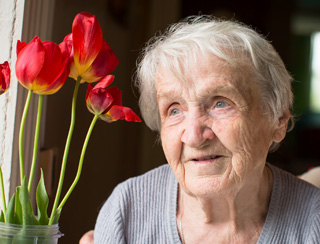
Living Alone with Dementia and Alzheimer’s
Many people with Alzheimer's continue to live successfully on their own during the early stage of the disease. Making simple adjustments, taking safety precautions and having the support of others can make things easier.
Legal and financial planning
If you live alone, it's crucial to make legal and financial plans now while you can participate in making decisions to ensure that others know your wishes and know what to do.
Self-care
Changes in thinking may reduce your ability to make appropriate decisions about self-care and your day-to-day needs as the disease progresses. You may be at increased risk for harm, falls, wandering and/or malnutrition. You also may have difficulty managing personal hygiene or household tasks, which can lead to unsafe living conditions. Plan ahead for how you will address your basic needs, including housing, meals and physical care. Consider Meals on Wheels, homemaker services, or services to help with managing medications or bill paying.
If friends or family have expressed concern about your ability to perform certain roles or tasks, listen to their observations. Alzheimer's will eventually limit your own insights as to what you can safely do.
Develop strategies to help you live day by day.
Tips:
- Arrange for someone to help you with housekeeping, meals, transportation and daily chores. Find services by contacting your local chapter or use our online tool, Community Resource Finder.
- Make arrangements for direct deposit of checks, such as your retirement pension or Social Security benefits.
- Make arrangements for help in paying bills. You can give a trusted individual the legal authority to handle money matters or speak with your bank or service provider about automatic bill pay.
- Establish a system for medication reminders.
There are several safety issues to consider that may help you maintain your independence for as long as possible.
Falls
You may experience changes in your balance that lead to an increased risk of falling. Changes in your sensitivity to light, the contrast between colors, or depth perception may affect your balance and comfort with navigating.
Driving
At some point, everyone with a diagnosis of Alzheimer's will no longer be able to drive. Planning ahead before driving becomes an issue can help you answer the question “How will I get from place to place when I can no longer drive?” Putting a plan in place can be empowering and provides the opportunity to make choices that can help maintain your independence for as long as possible.
Tips:
Plan for home-delivered meals if they are available in your community such as Meals on Wheels.
Arrange to have your local grocery store deliver your groceries.
Leave a set of house keys with a neighbor you trust.
Make arrangements for someone to regularly check your smoke alarm and carbon monoxide detector.
Wandering
Everyone with a diagnosis of Alzheimer's is at risk for wandering. Increased confusion and agitation can cause people with the disease to wander and get lost. Wandering can be very dangerous, and if you live alone, there is no one to monitor for changes that may increase your risk.
Isolation and loneliness
It is common to feel isolated or withdrawn from others after receiving your diagnosis or as the disease progresses. Establish a routine with friends and family that encourages you to stay connected with them. Also take advantage of programs and services that involve you with others living in the early stage of Alzheimer's.
Tips:
Have family, friends or a community service program call or visit you daily.
Keep a list of questions and concerns to discuss with them. Include items for them to check out around the house, such as electrical appliances, mail and food.
Asking for help
It can be difficult to know when to ask for help or to admit that help is needed. You may feel that by asking others for help, you will become too dependent on others. Have a conversation with family and friends about the daily tasks that have become more difficult for you to complete. Be specific about what they can do to help you.
Common unmet needs for individuals living alone include help with chores and self-care, such as bathing and meals. Investigate the options for in-home support services, including paid or volunteer caregivers, companionship care, housekeeping services or Meals on Wheels.
Consider seeking outside help. Many family caregivers must continue to work while trying to help loved ones living alone with Dementia. CareOne Senior Care provides in-home assistance to ensure safety, independence and continued quality of life. Our world class caregivers offer you and your family peace of mind. CareOne Senior Care offers companion care, help with completing the activities of daily life, transportation services, and much more.


